|
|
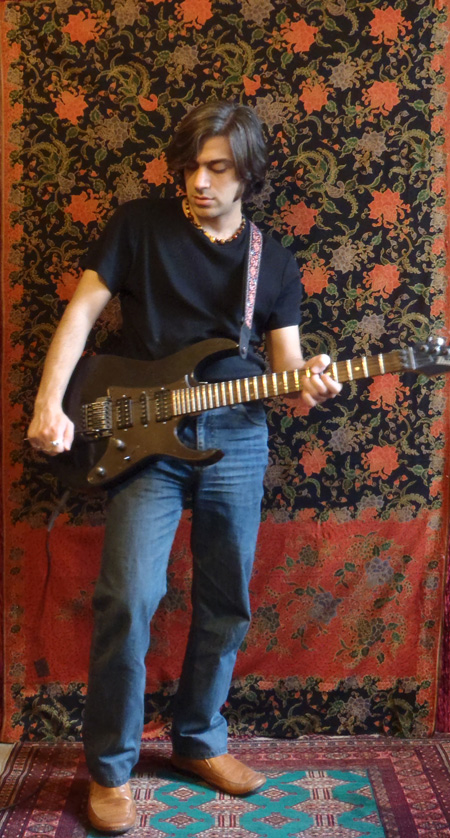
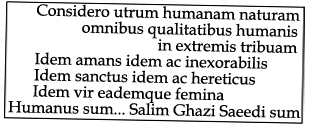
Salim Ghazi Saeedi
 was born in 1981
in Tehran, Iran. Despite the inactive rock scene in Iran, he decided
to challenge his fate by becoming a rock musician. was born in 1981
in Tehran, Iran. Despite the inactive rock scene in Iran, he decided
to challenge his fate by becoming a rock musician.
Salim started self teaching electric guitar and music production
from 1999. Meanwhile living outside contemporary rock music currents
in Iran made Salim shape his music style in a unique personal way.
It has been compared to surprisingly diversified bands from all over
the world like Univers Zero, King Crimson, John Zorn and Birdsongs
of the Mesozoic(*). In this regard Salim has found himself composing in
genres like art rock, rock in opposition, progressive metal and
jazz-fusion - with tinges of oriental music
according to critics.
Harmonie Magazine compared his guitar playing to King Crimson's
Robert Fripp and labled by Artrock.pl as "Persian King Crimson".
He is the producer, composer and performer of all instruments in his
instrumental music. He has coined the term "Pictorial Rock" as a
description of his compositions which is also the title of his blog:
"Pictorial rock" he says "is a term I use for my music that is
usually based on series of mental images, a nightmare or maybe
dreams of a sound sleep... As a listener, you have to wait for the
pictures to materialize in your mind!"
Salim had little chance to expand his music career in
his hometown, he has regularly kept on working. While in Arashk band
he released Abrahadabra (2006), Sovereign (2007) and Ustuqus-al-Uss
(2008). Afterwards he released Iconophobic (2010), Human Encounter
(2011), namoWoman (2012) as a one-man-band in Iran. Then he migrated
to Australia and released United Ubiquity of Flesh (2017).
His albums are concept albums hiring elements of classical and
electronic music and progressive rock with diversified use of
instruments. He describes himself as "an ever improviser... both in
performing and in composing." His main influences include Jeff Beck
and Thelonious Monk. Salim says about his style of music: "I never
decided to compose in progressive genre. I just have a very
versatile taste of music listening... Maybe this is how progressive
genre takes place. You let your mind free and it becomes
progressive!"
He currently lives in
Brisbane, Australia.
* Visit Who Do I Sound Like
page for a complete listing.
Extensive Bio
Childhood
Salim Ghazi Saeedi was born in 1981 in Tehran, Iran. During his
childhood, Iran was at war and consequently the art scene was very
deprived. Even in the years after the war, the music scene was
merely limited to “permitted” materials that mostly embraced
traditional and “conservative” music. Most of contemporary western
music - specially rock music - never published by domestic or
foreign publishers and so never existed on the market.
Salim remembers, "as a 12 teenager, all the music I had was a bunch
of copied tapes that I repeatedly listened to... Those days you
hadn't direct access to contemporary music productions. Among the
tapes I remember there was Queen and Michael Jackson...
But of course I didn't know the name of the records and I just
listened to whatever I found. Besides I also listened to some
overseas music radio programs and recorded them...". During those
years something special happened. He listened to a song by which he
was deeply affected. Of course he did not know its title or meaning
but years later it changed his life... It was "Something in the Way"
by Nirvana.
Actually, nobody among Salim's family was a musician or even had an
instrument in their home. Salim recalls "The first instrument I
touched was at 18 - when I bought one!
During his childhood, Salim's main obsession was computers. His
parents bought a Commodore 64 for him at the age 10 and he began
learning computer programming. At 16 he had a computer with CD Drive
and it meant a whole new world musically. "I bought copied versions
of Audio CDs from black market for about $20 and it was a lot of
money in my currency".
Learning music
There was a turning point in Salim's musical life and it was during
his 17 years old in which he was studying for university entrance
exam. "In a radio program I found out the name of the enchanting
song I listened in the past: "Something in the Way". There was more
than that. There was a story from singer's (Kurt Cobain's)
childhood: Cobain's parents divorced and threw his things into the
river. He retrieved them, sold them and bought an acoustic guitar.
The story struck me and I got mad. I bought a copy of Nirvana’s
Nevermind and continually listened to it. I continually listened to
it for one year almost everyday!"
"...Kurt Cobain became my mythical hero. After I went to the
university I had access to the Internet for the first time. I
started downloading the lyrics (and meanwhile enhancing my English!)
I found my “teen spirit” there... I bought an acoustic guitar and
downloaded Nirvana's tabulators. I was obsessed. I never knew why I
played guitar and I never decided to become a musician. I just
played guitar because Kurt Cobain did!"
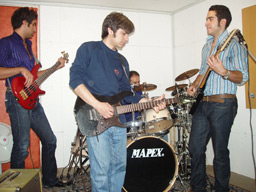
Salim studied Industrial Engineering at university but he had a dual
life in those years. He was learning guitar and discovering the
world's art scene while dealt with "engineering" culture. "Before
university I was more into technology and computers. After
that I started to learn about artistic expression. It was
fundamentally a new phenomenon."
The
musical journey began:
1999:
He started learning guitar and studying music by self-study. He
never had a music teacher or attended a music school.
2004: Salim joined Arashk band. Arashk's activity from its formation
(2001) till that date was limited to a few college concerts playing
cover songs and 4-5 original songs by Pouyan and Shahram (other
Arashk members). The publication of these songs delayed until 2008.
Abrahadabra (2006)
2006: Salim composed, performed (guitars & keyborads), recorded and
mixed the album "Abrahadabra"
in his home studio and published it via CDBaby.
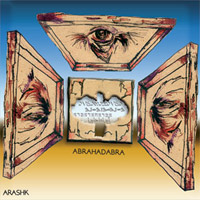 Salim
comments on this album (extracted from an interview by
progarchives.com): Salim
comments on this album (extracted from an interview by
progarchives.com):
"Abrahadabra is a reflection of my exaggerated personal feelings. It
is the first endeavor to my idea of “pictorial rock” - i.e. the
composition of sounds that recite sequence of mental pictures.
Actually all of those instrumental tracks have a real-life story
behind them. There are very vague allusions to these stories in CD
booklet. e.g. “Route” is a story of a death ceremony and reflects
the mourning over dead in way that is done in eastern culture. Or
“Told to the Bird” is story of me confessing to a bunch of flying
birds in a ritualistic way… In one word I was very lovesick,
idealist and outraged while composing them."
One may choose the term "Pictorial Rock" for these instrumental
songs because there have been tried to a painting canvas be
represented by them. A painting with much exaggerated details. Salim
points that "...I like exaggerated details and very subtle
techniques of the instrument and when I come across to composing a
catchy part in one song, I see no reason for repeating it. If
someone liked that part, he can rewind the song!"
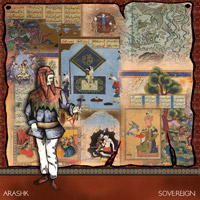 Sovereign (2007) Sovereign (2007)
2007: Salim composed, performed (guitars & keyborads), recorded and mixed
the album "Sovereign"
(Arashk members contributed in one track) in his home studio and
again published it via CDBaby. His comments on this album:
"Sovereign is an instrumental recitation of Shahnameh (The Epic of
Kings) i.e. an extensive Persian epic poems written by Ferdowsi
(935–1020) as a collection of Persian mythologies. You will find
western rock instrumentation with eastern flavor. Some songs I think
are apt to be adapted for traditional Iranian dance; especially
“Sovereign” and “Harem” tracks. I am looking forward choreographic
performance adaptation for this work whenever possible. Imagine
Iranian “Coffee-house” paintings and belly dance with distorted
guitars performing cheerful rhythms… Unusual combination? No, to me
that sounds all natural!"
2008: Salim and one of Arashk members (Shahram) established a more
professional sound recording studio. Salim worked as sound engineer
and sound recorder. Beside recording our next albums in this studio,
they also had projects from studio customers.
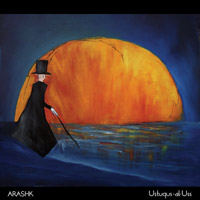 Ustuqus-al-Uss (Mar 2008) Ustuqus-al-Uss (Mar 2008)
Mar 2008: Salim composed, performed (guitars & keyborads), recorded and
mixed the album "Ustuqus-al-Uss"
(Arashk members contributed in two tracks). The album published via
CDBaby. Salim notes:
"In this album I somehow inclined to jazz fusion and classic
instrumentation. I think the eastern “blend” still dominates e.g. in
“Ustuqus-al-Uss-al-Avvalin-val-Akharin” which I think is the most progressive tune I have ever
made (The second catchy guitar solo is performed by Pouyan). Some
songs are extremely personal e.g. “Naught been I thou” which is a
off-beat jazzy with unusual dance elements… These songs are my
utmost fears and hopes - to a degree that made me mute from
communicating by words. And thus they become instrumental sounds…"
YELL (Oct 2008)
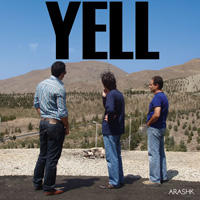 Oct
2008: Arashk members compiled the songs that Pouyan and Shahram had written
since 2001 into one album "Yell". This was a hard rock album with
vocals. Salim sound engineered the recorded and contributed in
playing rhythm guitar. For more information on this album
visit YELL album
page at arashkband.com Oct
2008: Arashk members compiled the songs that Pouyan and Shahram had written
since 2001 into one album "Yell". This was a hard rock album with
vocals. Salim sound engineered the recorded and contributed in
playing rhythm guitar. For more information on this album
visit YELL album
page at arashkband.com
2009: Salim and Shahram ended the studio because music industry in
Iran was too poor and limited to support our business - at least in
rock genre.
Iconophobic (2010)
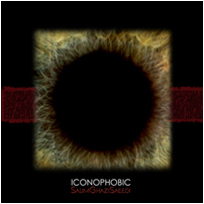 2010:
Salim composed, recorded and mixed the album "Iconophobic"
in his home studio and released it under his own name.
Some notes on Iconophobic: 2010:
Salim composed, recorded and mixed the album "Iconophobic"
in his home studio and released it under his own name.
Some notes on Iconophobic:
“My fourth album, "Iconophobic" hires more classical instruments
than before. It is a combination of electronic beats and progressive
symphonic rock. This album is a concept album about fearing the
world of imagery. I don't know if it is really a psychological
problem but I liked the idea of morbid alienation toward images,
icons and in general, reality. The Iconophobic's booklet contains a
passage in form of a circle that reads:
"Alas that man was free...When there was no image.
Alas that image became a means... for altering the reality.
Alas that reality... is itself, an imagery by man."
When
There is More Beauty in the Contrary (Salim Ghazi Saeedi and Negar
Bouban) 2011 Single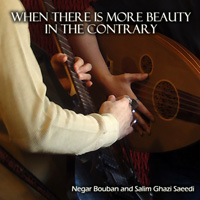
1/1/2011: "When There is More
Beauty in the Contrary" is a single song released on 1/1/11 as a
collaborative work by Salim Ghazi Saeedi and Oud Player, Negar
Bouban.
According to ReviewYou.com's review on this single by Matthew Forss:
"When There is More Beauty In The Contrary might sound like a song
that attempts to discuss the philosophy of aesthetics or
phenomenology. However, the nearly four-minute track is an
instrumental song that connotes sounds of higher thinking that
border on magnificent."
Human
Encounter (2011)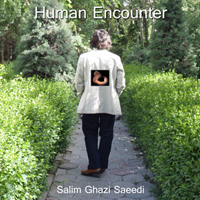
Oct 2011:
Salim released
a jazz-rock concept album with a story backing up by his real life
experiences. Most of the songs are dedicated to events of his life
or to the human beings he adores. Read the full story
here.
In this album he limited his instrumentation mostly to double bass,
piano, electric guitar and drums... With some songs even in double
bass/piano/drums trio.
namoWoman (2012)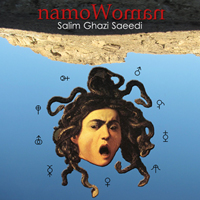
Oct 2012:
About the concepts behind namoWoman
composition, Salim says "I have always found the assumption of
impossibility, an important trick against my mind - a human mind
that usually prefers patterned and inductional methods of
cognition." Salim adds: "As an artist, creating and experimenting
yet unexplored mental realms has always fascinated me and in order
to trick my mind into pushing toward new possibilities, I like
experimenting around fundamental concepts like human sexuality.
Ideas like considering human sexuality beyond its dualistic nature
let me to enter a new mindset and fascinations about worlds of
non-Carbon based life, gradually fed my creativity for namoWoman.
Maybe I can say this mindset forced my mind to respond on vital
levels and challenged its own existence..."
United
Ubiquity of Flesh (2017)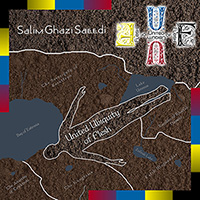
United Ubiquity of Flesh (2017) is
an instrumental prog rock album by Salim Ghazi Saeedi, exploring
sonic and conceptual contrasts on multi levels. You find energetic
hard rock guitar and drums balanced by rhythm-free solo guitar parts
- similar to traditional Middle Eastern players. Silence - aka
musical rests - plays an active part; sometimes by bolding music
tones or naked solo guitars on intensively rhythmic bass and drums.
Musical Influences:
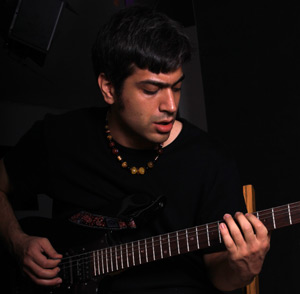 His
main influences include Jeff Beck, Charlie Clouser (former
keyboardist of Nine Inch Nails), Marty Friedman, Tool and Nirvana.
He also enjoys listening to Chet Atkins, Megadeth, The Prodigy,
Thelonious Monk and world music like Marcel Khalife. His
main influences include Jeff Beck, Charlie Clouser (former
keyboardist of Nine Inch Nails), Marty Friedman, Tool and Nirvana.
He also enjoys listening to Chet Atkins, Megadeth, The Prodigy,
Thelonious Monk and world music like Marcel Khalife.
As the taste varies widely, his musical style varies wildly...
"Maybe one reason that I compose music is that I cannot find any
published music satisfying 100% of my expectations... Even in
listening to my favorite songs I usually listen to some special
parts of them." Salim quotes.
"Almost all of my songs have a story behind them. Usually a special
situation dominates and it implies as a melody line or rhythmic
phrase... I immediately record that part and listen to it over and
over. I always refer to my intuition and seek the rest of the
unfinished song within my inner ear. Trust your intuition - however
eccentric it may represent - and it works the magic out!"
Salim notes about his music genre that mostly seems progressive
rock: “I never decided to compose in progressive genre. I just have
a very versatile taste of music listening. I listen to Pantera and
Chopin in a row! Maybe this is how progressive genre takes place.
You let your mind free and it becomes progressive!”
Who do I sound like?
Visit
Who Do I Sound Like page for a complete
listing.
FAQ
What is that black
semi-circle in logo?
That indicates the word "world" in domain's name. The no-thing
potentiality that reflects Life.
Why you make music?
I don't know. I guess to mean is to deliberate and deliberation is
just a prejudice.
Your website is available in 15+ languages.
Do you use automatic translation tools?
No. All website translations are done by fans, through my
Babel Project or human translators
on
cucumis.org, a collaborative translation platform. |
    
More Links
|